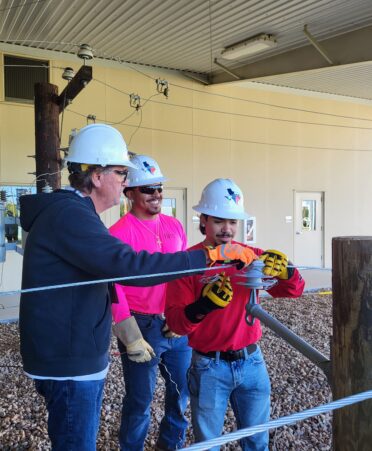(ROSENBERG, Texas) – It can be easy to think of lineworkers’ jobs as being emergency-focused. When a storm rolls in and power lines are down, lineworkers roll in to restore electricity to homes and businesses.
But while that is an essential role they play, the work they do every day to keep the lights on is just as important.
Students in the Electrical Lineworker and Management Technology program at Texas State Technical College are taught everything they need to know to lead a successful career in the field, emergency or not.
“Our day to day is making sure the lights stay on and providing service to the customer,” Jason Abke, an instructor in the program, said of lineworkers. “Rebuilding and upgrading systems, reconductoring from a lower to a higher voltage — everything is to improve service to the customer.”
Power lines and electrical grids do not last forever. A lineworker crew is needed to replace failing parts, fix broken ones, or build new lines where there were none. To that end, TSTC students are taught with as much hands-on training as possible to prepare them for problems they will face on the job.
“The first year or so in the field will mostly be getting to know the utility company they are working for,” Abke said. “No utility works the same. They’ll probably stick with the same crew, but for some, they might do cross-training with others.”
Abke pointed out that utility companies make money when the meter is turning. The lineworker crews are there on a day-to-day basis to ensure that everything is not only functioning, but functioning well. A typical workday consists of making sure that gear is in order when heading to the worksite and then returning home in the evening.
“It can be hard to describe to people that don’t know much about lineworking,” Abke said. “You go where the work is and the utility tells you to. Most of the students here will end up working on new lines or maintaining old ones.”
While the details of the daily tasks and responsibilities will vary based on which company graduates of the program go to work for, the fundamentals and gear will remain the same. Helping students familiarize themselves with the basics and helping them think critically about problems and solutions is what the lineworker program is all about.
According to onetonline.org, electrical power-line installers and repairers can earn an average annual salary of $65,730 in Texas. The website projected that there would be a 24% increase in the number of such jobs in the state from 2020 to 2030.
TSTC offers Electrical Lineworker and Management Technology at its Abilene, Fort Bend County, Harlingen, Marshall and Waco campuses. An Associate of Applied Science degree and a certificate of completion are available.
The program is part of TSTC’s Money-Back Guarantee, which refunds a participating graduate’s tuition if he or she has not found a job in their field within six months of graduation. For more information, visit tstc.edu/mbg.
Registration for the spring semester is now open. For more information, go to tstc.edu.
